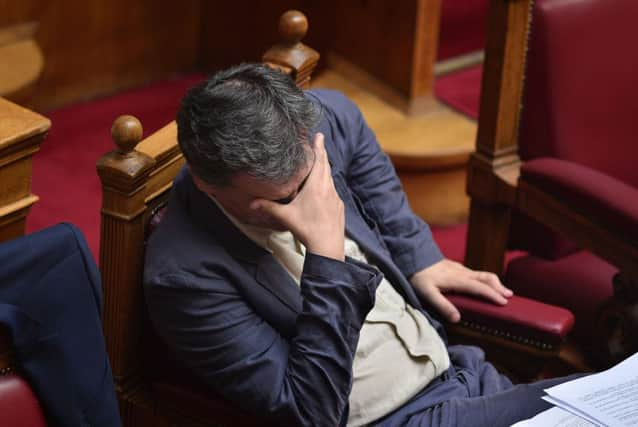Greek parliament debates on new austerity bill


The raft of consumer tax increases and pension reforms will condemn Greeks to years of more economic hardship and has fuelled anger among the governing left-wing Syriza party.
Civil servants protested with a 24-hour strike that disrupted public transport and shut down state-run services across the country. Thousands marched through central Athens in an anti-austerity protest timed to coincide with the parliamentary procedure late last night.
Advertisement
Hide AdAdvertisement
Hide AdThe bill was expected to pass with votes in favour by pro-European opposition parties, but large numbers of Syriza MPs were almost certain to vote against the package.
Deputy finance minister Nadia Valavani resigned from her post, saying she could not vote in favour of the bill.
In a letter she sent to Prime Minister Alexis Tsipras on Monday and released by the finance ministry yesterday, Ms Valavani said she believed “dominant circles in Germany” were intent on “the full humiliation of the government and the country”.
The economy ministry’s secretary general, Manos Manousakis, also resigned over the agreement. A meeting between the parliament speaker and deputy speakers was being held last night to decide on the exact timing of the parliamentary debate and vote.
A similar vote last week was concluded after 3am after a debate that started at midnight.
Mr Tsipras agreed to a deal after a marathon 17-hour eurozone summit that ended on Monday morning. It calls for Greece to pass new austerity measures his left-wing government had long battled against in return for the start of negotiations on a third bail-out worth about e85 billion (£60bn) in loans over three years.
The government, a coalition between Syriza and the small right-wing Independent Greeks, holds 162 seats in Greece’s 300-member parliament. More than 30 of Syriza’s own MPs have publicly voiced objections.
Mr Tsipras has acknowledged the measures he agreed to go against his election pledges to repeal austerity, and described them in a Tuesday night television interview as “irrational”.
Advertisement
Hide AdAdvertisement
Hide AdBut he said he had no option if he was to prevent Greece’s financial collapse.
The International Monetary Fund (IMF), which was involved in Greece’s previous two bail-outs and will also play a role in the third, has long argued the country’s debt is too high and that any deal must include debt relief – something the Greek side has also insisted on.
In a report released late on Tuesday, the IMF said Greece’s debt was now “highly unsustainable” and would reach “close to 200 per cent of GDP in the next two years,” a view which was echoed yesterday by the European Commission.